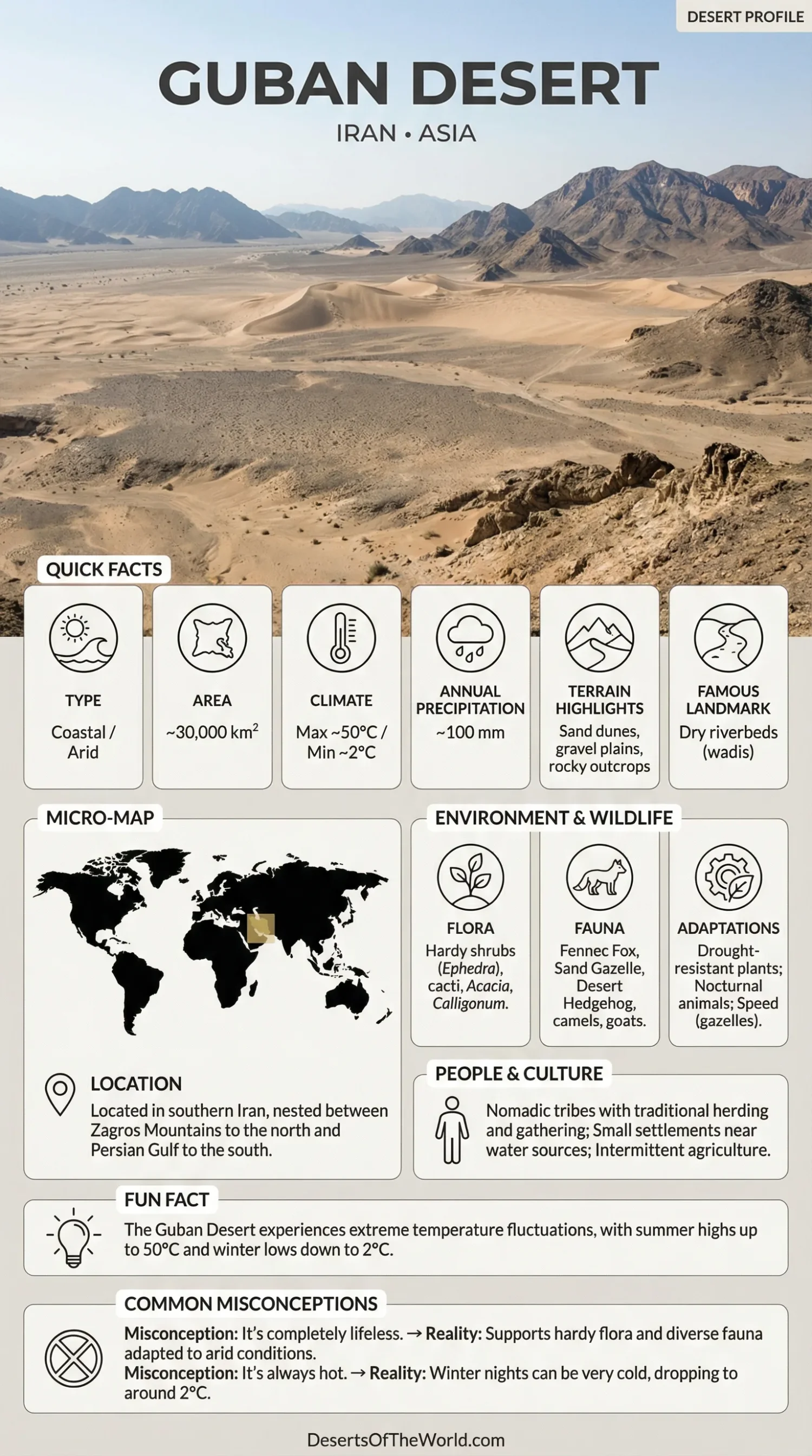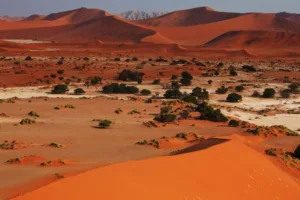Location & Continent
Continent: Africa
Country: Somalia (Somaliland region)
Coordinates: 10°30′N, 45°00′E
Click to load the interactive map
Physical Features
Area: Narrow coastal desert plain, stretching ~1,600 km²
Elevation: Low-lying coastal zone, between Gulf of Aden and Somali Highlands
Notable Landforms: Dry riverbeds (wadis), gravel plains, sandy coastal flats
Climate & Precipitation
Temperature: Extremely hot; summer highs often exceed 45°C
Precipitation: Less than 150 mm annually; mostly during brief rainy seasons
Ecological Features
Ecozone: Coastal desert strip
Biome: Deserts and xeric shrublands
Ecoregions: Ethiopian xeric grasslands and shrublands (transition zone to Somali montane areas)
Flora & Fauna
Flora: Sparse shrubs, grasses, drought-resistant acacia
Fauna: Camels, goats (domesticated), desert-adapted reptiles, occasional antelopes and birds
Geology & Notable Features
Geology: Arid coastal sediments, gravel plains, volcanic uplands nearby
Notable Features: Lies between Gulf of Aden coast and Golis Mountains; traditional pastoralist grazing area
Overview of the Guban Desert
The Guban Desert, located in the southern region of Iran, is an extraordinary and vast stretch of arid landscape. Covering an area of approximately 30,000 square kilometers, it is known for its unique geological formations and extreme climatic conditions.
Geography and Location
The Guban Desert is nestled between the Zagros Mountains to the north and the Persian Gulf to the south. Its geographical coordinates are approximately 28.5°N latitude and 49.5°E longitude. The desert features varied topography, including vast sand dunes, gravel plains, and rocky outcrops.
Climate
This desert experiences an arid climate, characterized by high temperatures during the day and significantly cooler nights. Rainfall levels are sparse, averaging about 100mm annually, making it one of the driest regions in Iran.
Temperature Range
The temperature in the Guban Desert can soar up to 50°C (122°F) in the summer months, while winter temperatures can plummet to around 2°C (35.6°F). Such extreme temperature fluctuations contribute to its unique desert ecosystem.
Flora and Fauna
Despite the harsh environment, the Guban Desert supports a variety of life. Vegetation primarily consists of hardy shrubs and cacti that have adapted to the arid climate. Popular species include:
- Ephedra – a drought-resistant shrub
- Acacia – known for its resilience
- Calligonum – a key species in desert ecosystems
Moreover, the desert is home to several animal species adapted to extreme conditions, such as:
- Fennec Fox – a nocturnal desert fox
- Sand Gazelle – known for its speed
- Desert Hedgehog – a small insectivore
Comparison of Major Deserts
The Guban Desert can be compared to other major deserts of the world based on various factors, such as area, climate, and biodiversity. Below is a detailed comparison table:
| Desert | Area (sq km) | Average Rainfall (mm) | Temperature (Max/Min °C) | Biodiversity |
|---|---|---|---|---|
| Guban Desert | 30,000 | 100 | 50/2 | Moderate |
| Sahara Desert | 9,200,000 | 250 | 50/-10 | High |
| Atacama Desert | 105,000 | 15 | 28/0 | Low |
Human Activity
Human activity in the Guban Desert is limited primarily to nomadic tribes that have adapted their lifestyles to the harsh conditions. Traditional practices include herding and gathering of desert plants for food.
A few small settlements are also established near water sources, where agriculture is practiced intermittently, mainly focusing on crops that can withstand drought conditions.
Conclusion
The Guban Desert is an intriguing and unique destination that showcases the resilience of nature in extreme conditions. From its vast landscapes to its diverse life forms, the Guban Desert remains an area of immense ecological and geological interest.
For adventurers and researchers alike, this remarkable desert offers a plethora of opportunities to explore the natural wonders and study the adaptations that sustain life in such an unforgiving environment.


